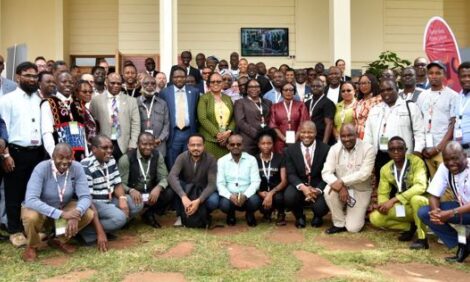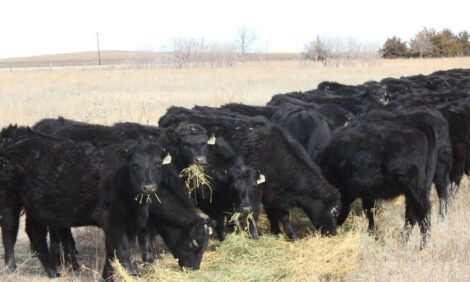



Green Shoots of Recovery Emerging?
ANALYSIS - Following a long period of volatile commodity prices, financial restraints, tight money markets in the banking sector and a consumer reluctance to spend, the green shoots of recovery for the meat processing sector could be gradually emerging, writes Chris Harris.In the US a recent Fitch Ratings' quarterly update on the US protein industry did not paint a particularly rosy picture showing pressure was still on the processors.
It showed a significant magnitude of margin contraction in beef and pork processing.
The report for the first quarter of the year examined the dynamics surrounding this relatively recent trend.
According to the report, meat processing margins are compressing because wholesale pricing is not always keeping pace with changes in livestock costs.
However, what may be more telling about the potential recovery of the sector is the willingness for companies to invest.
Research by Industrial Info Resources shows that drink manufacturers and distributors across North America are in the middle of a spending spree to build facilities and expansions.
They are also putting forward plans for maintenance for existing operations.
Industrial Info identified more than 150 capital and maintenance projects that have been proposed for the first quarter of this year that have a combined total investment value of more than $2.2 billion. Individual projects range in value from $500,000 to $300 million.
The projects include grassroots construction, plant and process additions, automation, consolidation, dismantlement, expansion, modernisation, rebuilds, reconfiguration, relocation, renovation, replacement, retrofit, revamps, upgrades, maintenance programs, maintenance shutdowns and environmental upgrades.
Beef Plant Investments
In the meat processing sector, this growth in investment in building and maintenance projects is typified by the plans at Tyson Fresh Meats.
The company is making major improvements to its Dakota City beef plant. The changes are expected to bolster the future of the Dakota City operation but may lead to the closure of the company's small beef plant in Denison, Iowa.
The multi-million dollar project at Dakota City will upgrade or replace parts of the plant that were originally built almost 50 years ago.
The improvements will include state-of-the-art processes and technology designed to benefit animal handling, food safety, meat quality and workplace safety.
The Dakota City project, which is already under way, is scheduled to be completed in mid-2013. It includes construction of a new beef slaughter floor that will incorporate the latest sanitation and production systems.
The company is also making improvements to the Dakota City plant's beef carcase cooler, rendering and box handling operations, as well as employee lockers and cafeteria. Changes in the plant's box handling system will involve the installation of additional conveyors and other equipment that will enable the facility to more efficiently handle the product mix.
At Cargill, a recent $6.1 million investment by Cargill to upgrade an aging boiler system at the company's Plainview, Texas, beef processing facility has increased efficiency, reduced energy consumption and added steam capacity that will enable the facility to grow and expand product offerings to customers, both present and future.
Foodmate US recently bought a larger building for its headquarters to accommodate its continued growth.
Investment in BRIC countries
Similar investment has been seen in companies around the world, notable, and perhaps not surprisingly, in the BRIC countries of Brazil, Russia, India and China.
Brasil Foods S.A. (BRF) recently established a joint venture with Dah Chong Hong in China aimed at gaining access to the Chinese distribution market, engaging in local processing, developing the Sadia brand in China, and reaching retail and food service channels in continental China, Hong Kong and Macau.
Brasil Foods also acquired Heloísa Indústria e Comércio de Produtos Lácteos Ltda, based in Terenos, state of Mato Grosso do Sul.
In Russia, the Cherkizovo Group is making good progress at its three new pork complexes in the Tambov, Lipetsk and Voronezh regions of Central Russia.
Cherkizovo began construction at the sites in autumn 2010 and, following the launch of breeding facilities in 2011, is to launch additional rearing facilities at all three complexes.
It is anticipated that the construction will be completed in 2012, once the fattening facilities are finalised. The complexes are expected to reach their total combined capacity of 37,500 live-weight tonnes by the end of 2013.
In 2011, Russia's Miratorg Agribusiness Holding consolidated its status as a leader in pork production as well as becoming the biggest fodder manufacturer in Russia.
The total volume of Holding's implemented investments amounted 55 billion roubles. Miratorg increased its workforce to 9000.
In Europe, Finnish meat processor Atria is to centralise production of meat products in Sweden aimed at streamlining and automating the production process of ham products and the slicing of cold cuts.
Atria is investing approximately €4.7 million in new production equipment for the Malmö plant. The production of ham products and cold cuts will be transferred from the Halmstad plant to the Malmö plant.
Positive Company Results
These positive and optimistic trends can also be seen in the latest results from some of the leading meat and poultry processing companies.
In the US, Tyson Foods reported a rise in first quarter sales of 9.4 per cent compared to last year up to $8.3 billion.
Multinational food and commodities processing company Sara Lee saw net sales increase for the second quarter of the year increase by six per cent.
Sanderson Farms reported net sales for the first quarter of 2012 at $517.8 million compared with $427.7 million for the same period a year ago.
While Hormel Foods reported a drop in net earnings for the first quarter of the financial year of 14 per cent - down to $128.4 million from $148.8 million a year ago, Jeffrey M. Ettinger, chairman, president and chief executive officer said the first quarter earnings of 48 cents per share was the second best in the company's history, albeit down from a year ago.
Meanwhile in Brazil, meat processing giant JBS posted consolidated net revenue of R$15,567.8 million in the third quarter of the year, 10.6 per cent higher than in the third quarter of 2010.
In its quarterly report, Marfrig posted record net revenues of 5.52 billion real (BRR) in the third quarter of 2011, and a 180 per cent increase in operating cash flow from the previous quarter.
In Europe, Finnish meat processor HKScan's net sales rose to €2,491.3 million compared to €2,113.9 million in the previous year - a rise of 17.9 per cent.



